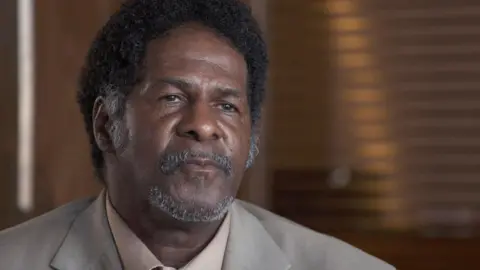Tennessee grants $1 million to wrongly convicted man
 CBS News
CBS NewsA man jailed for 31 years for a crime he did not commit has won $1 million compensation.
The Tennessee Board of Claims unanimously voted to compensate Lawrence McKinney, 61, on Wednesday.
Imprisoned in 1978 for rape and burglary, Mr McKinney was freed in 2009 and formally exonerated in December.
His compensation award is the maximum the state can grant him, after providing just $75 on his initial release.
It is the highest amount Tennessee has ever granted.
"We thank the governor, and we thank the board," said David Raybin, a lawyer for Mr McKinney.
"Highest amount ever paid, but then again, no one was ever incarcerated for this long."
Allow X content?
Why was he in prison?
In October 1977, Mr McKinney was arrested in Memphis after a woman claimed he was one of two men who raped her in her apartment.
He was charged with rape and first degree burglary, and following his conviction in June 1978 he was sentenced to 115 years in prison.
He was 22 years old.
Thirty years later, in August 2008, a DNA test of the victim's bedding identified three people, none of whom were Mr McKinney.
His conviction was vacated (or set aside) and he was released in July 2009.
Mr McKinney says he was in prison for 31 years, 9 months, 18 days, and 12 hours.
What about compensation?
On his initial release, Mr McKinney reportedly received just $75 after three decades behind bars.
"Because I had no ID it took me three months before I was able to cash it," McKinney told CNN.
After he was freed, Mr McKinney sought a full exoneration - in other words formally declared not guilty.
But in 2016, a parole board unanimously voted against him.
One board member defended their decision not to exonerate him, writing in a local newspaper, "The victim's descriptions to police matched McKinney's description, to a tee."
However, Tennessee Governor Bill Haslam went against the parole board's verdict and unilaterally exonerated him in December 2017.
The exoneration meant Mr McKinney could apply for compensation. His lawyers, David Raybin and Jack Lowery, decided to push for the maximum allowed sum, $1m.
"A person is deprived of their life and freedom," Mr Raybin said at the time of the filing. "In my view Mr McKinney is entitled to far more than $1m based on what's happened to him."
Allow X content?
How does the compensation work?
Mr McKinney will not receive the amount as a lump sum.
He will received $353,000 upfront to pay his lawyers and his debts, but the rest of the amount will be spread out in monthly payments of $3,350 over a minimum of ten years.
The money will go to his wife or his estate if he dies in that time.
